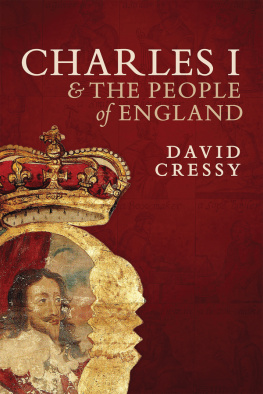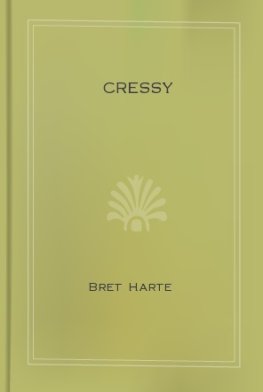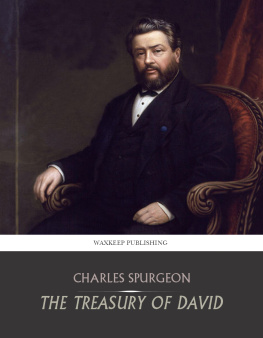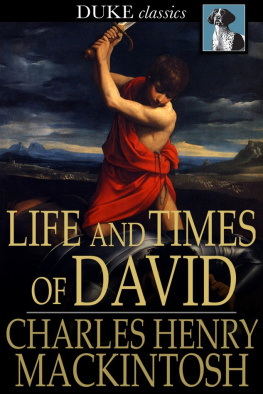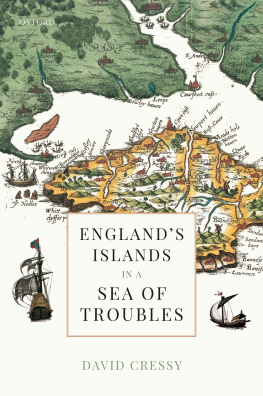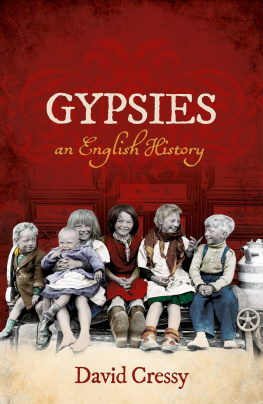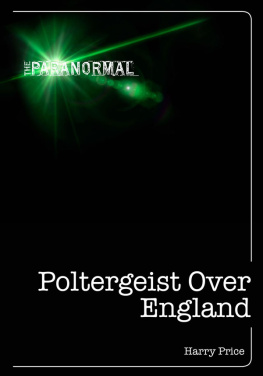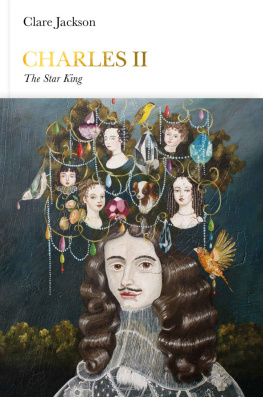Cressy David - Charles I and the People of England
Here you can read online Cressy David - Charles I and the People of England full text of the book (entire story) in english for free. Download pdf and epub, get meaning, cover and reviews about this ebook. City: New York;Oxford;Wielka Brytania, year: 2018;2015, publisher: Oxford University Press, Incorporated, genre: Politics. Description of the work, (preface) as well as reviews are available. Best literature library LitArk.com created for fans of good reading and offers a wide selection of genres:
Romance novel
Science fiction
Adventure
Detective
Science
History
Home and family
Prose
Art
Politics
Computer
Non-fiction
Religion
Business
Children
Humor
Choose a favorite category and find really read worthwhile books. Enjoy immersion in the world of imagination, feel the emotions of the characters or learn something new for yourself, make an fascinating discovery.
- Book:Charles I and the People of England
- Author:
- Publisher:Oxford University Press, Incorporated
- Genre:
- Year:2018;2015
- City:New York;Oxford;Wielka Brytania
- Rating:5 / 5
- Favourites:Add to favourites
- Your mark:
- 100
- 1
- 2
- 3
- 4
- 5
Charles I and the People of England: summary, description and annotation
We offer to read an annotation, description, summary or preface (depends on what the author of the book "Charles I and the People of England" wrote himself). If you haven't found the necessary information about the book — write in the comments, we will try to find it.
Charles I and the People of England — read online for free the complete book (whole text) full work
Below is the text of the book, divided by pages. System saving the place of the last page read, allows you to conveniently read the book "Charles I and the People of England" online for free, without having to search again every time where you left off. Put a bookmark, and you can go to the page where you finished reading at any time.
Font size:
Interval:
Bookmark:

of England

Great Clarendon Street, Oxford, ox 2 6 dp , United Kingdom
Oxford University Press is a department of the University of Oxford. It furthers the University's objective of excellence in research, scholarship, and education by publishing worldwide. Oxford is a registered trade mark of Oxford University Press in the UK and in certain other countries
David Cressy 2015
The moral rights of the author have been asserted
First Edition published in 2015
Impression: 1
All rights reserved. No part of this publication may be reproduced, stored in a retrieval system, or transmitted, in any form or by any means, without the prior permission in writing of Oxford University Press, or as expressly permitted by law, by licence or under terms agreed with the appropriate reprographics rights organization. Enquiries concerning reproduction outside the scope of the above should be sent to the Rights Department, Oxford University Press, at the address above
You must not circulate this work in any other form and you must impose this same condition on any acquirer
Published in the United States of America by Oxford University Press 198 Madison Avenue, New York, NY 10016, United States of America
British Library Cataloguing in Publication Data
Data available
Library of Congress Control Number: 2014943831
ISBN 9780198708292
ebook ISBN 9780191018008
Printed in Great Britain by Clays Ltd, St Ives plc
Links to third party websites are provided by Oxford in good faith and for information only. Oxford disclaims any responsibility for the materials contained in any third party website referenced in this work.
As always, I am beholden to the many scholars who have shaped and sustained my work. Special thanks are due to Tim Breen, Tom Cogswell, John Craig, Barbara Donagan, Lori Anne Ferrell, Chris Haigh, Tim Harris, Steve Hindle, Mark Kishlansky, Chris Kyle, John Morrill, Jason Peacey, the late Kevin Sharpe, Alison Wall, and Michelle Wolfe, though we do not always agree. Valerie Cressy saved me from myriad errors; any remaining are mine alone.
I am grateful to the National Endowment for the Humanities for a full-year fellowship in 2011, to the Huntington Library for its ambience as well as its collections, and to the Ohio State University for research support over several years. The work would have taken even longer without access to State Papers Online.
All dates are given old style, with the year taken to begin 1 January. All works cited were published in London unless otherwise indicated. Englands monetary system made twelve pennies (abbreviated d. for denarii) one shilling, and twenty shillings (abbreviated s. for solidi) one pound (indicated for librae). Standard abbreviations include:
APC | Acts of the Privy Council |
BL | British Library |
CSPD | Calendar of State Papers, Domestic |
HMC | Historical Manuscripts Commission |
ODNB | Oxford Dictionary of National Biography |
TNA | The National Archives, Kew |
Lucy Martin, the wife of a London tailor, wanted to meet the king. She wanted a private audience with Charles I to warn him of dangers facing his kingdom, and also to unburden herself of deeply troubling personal sins. Lucy Martin approached her monarch with the visionary conviction of a prophet and the ingenuity of a London housewife. She imagined herself as a dutiful subject bearing an urgent message, but she also wanted the king to serve as her confessor. She was evidently moved by notions of love and obligation, and the reciprocity of duties between the king and his people.
Not surprisingly, Lucy found King Charles to be screened and protected by layers of courtiers, councillors, and guards. She was not to know that Charles I was especially prickly about his regal dignity, nor that his style of kingship made him more than ordinarily remote. But anyone could have told her that kings did not normally commune with common subjects.
Failing to find a conventional avenue of access, Lucy Martin committed her message to paper. (She was one of the minority of metropolitan women who knew how to write, in her case with a strong but idiosyncratic script.) On Palm Sunday, 2 April 1626, she joined the crowd of citizens who were traditionally admitted to the Lenten sermons at court, and positioned herself in the public area on the terrace above the outdoor preaching place at Whitehall. Judging her moment, as the king and courtiers proceeded to their seats, she wrapped her letter around a stone and lobbed it towards King Charles. It landed in the royal pew, to much surprise and consternation.
In her letter to King Charles, Lucy Martin prayed for God to look down with the eyes of mercy, pity and compassion on us all, for our sins do stink worse nor [i.e. than] Sodom and Gomorrah, city, court and country. This put her in the tradition of moralists and reformers who railed against drunkenness and swearing, venality and irreligion. She prayed that God would bless our king and make him as wise as Solomon, as holy as David, for thy Christ Jesus sake, make him like that good king Joshua. These words bore close resemblance to official prayers at Charless coronation two months earlier, that the new king be armed with the fortitude of Joshua, exalted with the humility of David, [and] beautified with the wisdom of Solomon. As successors to the people of Israel, the people of England prayed for a king with the character of an Old Testament godly monarch.
Lucys letter then took a dangerous turn by referring to King Charless French catholic wife, Henrietta Maria. I pray God bless our queen and convert her to God, or confound her, that she do not bring a greater plague on us all. It is probably just as well that these words did not reach the king, who at that time had been married less than a year. Londoners knew that the queen had not joined her husband at his recent coronation because she could not abide protestant worship, and they would know that the ceremony had been postponed to avoid the citys worst outbreak of bubonic plague in living memory. Religious leaders almost universally attributed the plague to the wrath of God, some muttering furiously about the sin of Achan and divine displeasure at harbouring the accursed thing. It took little effort to associate the queen and her catholic retinue with religious contamination.
Lucy Martin then moved on to her personal troubles, her private moral and religious distress, and the urgency of her need for a royal audience.
I pray God to be merciful to me for presuming to sin. I am really possessed with an ill spirit. I pray God to take it out of me, for I know I shall never be well till our good king let me speak with him. In my fall and prayer I prayed God that he would send some sign, that the rulers might believe me, and when I was at my good sisters house in Great Marlow, as I was at prayer alone, my good God did put it in my heart that I should go to the rulers. Then I cried and said, oh God, thou knowest how oft I have been with them, and they will not believe me.
It sounds as if the thrown letter was not Lucy Martins first attempt to reach the monarch, only the most spectacular. Her claim of never being well until she spoke with the king suggests a chronic affliction that could only be remedied by royal thaumaturgy, like touching for the kings evil.
Font size:
Interval:
Bookmark:
Similar books «Charles I and the People of England»
Look at similar books to Charles I and the People of England. We have selected literature similar in name and meaning in the hope of providing readers with more options to find new, interesting, not yet read works.
Discussion, reviews of the book Charles I and the People of England and just readers' own opinions. Leave your comments, write what you think about the work, its meaning or the main characters. Specify what exactly you liked and what you didn't like, and why you think so.

